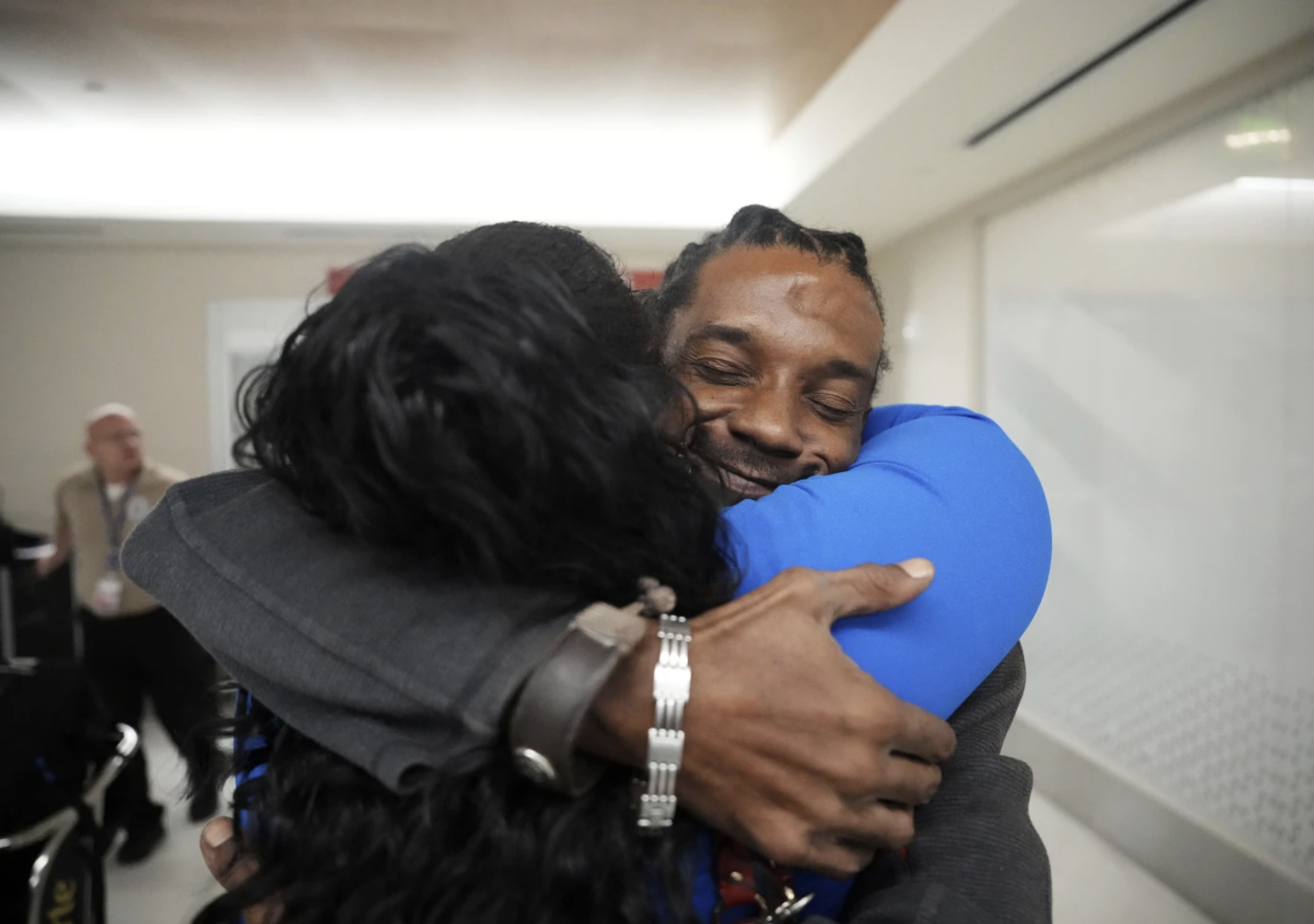
Our intervenor, Valerie, reuniting with her brother, Reginald, as he arrives for the first time to the United States from Haiti. Wednesday, Aug. 9, 2023. (AP Photo/Jim Rassol)
This lawsuit is on behalf of 21 states (led by Texas) challenging a process the Biden Administration established to permit nationals of specified countries to apply for and receive a two-year period of “parole”—a statutorily authorized form of temporary permission for a non-citizen to live in the United States. The Biden Administration created the first such process in April 2022, for Ukrainians; to date, no red state has challenged that process. In October 2022, DHS created a similar process for Venezuelans; then on January 5, 2023, that process was expanded to include nationals of Cuba, Haiti, and Nicaragua. The parole processes for these four countries are part of a package of “border security measures”–including new restrictions on access to asylum–that are intended to deter migrants from coming to the U.S. border with Mexico to apply for asylum.
In the complaint, Texas alleges that the Biden Administration’s creation of the parole processes for Cubans, Haitians, Nicaraguans, and Venezuelans (the “CHNV” parole programs) did not go through required procedures and that they constitute an unauthorized use of the statutory parole authority.
Texas filed this case in the Victoria Division of the Southern District of Texas, because there it had a 100% chance of it being assigned to Judge Drew Tipton (for more on why, see the third question in our FAQs). Shortly after the case was filed, the Biden Administration filed a motion to transfer the case to somewhere it would be randomly assigned a judge. Judge Tipton denied that motion to transfer on March 10, 2023.
In late March, a group of seven U.S. citizens, represented by Justice Action Center, RAICES, and the Center for Immigration Law and Policy (CILP) at the UCLA School of Law, who have or are applying to sponsor noncitizens to come to the United States through the CHNV programs filed a motion requesting that Judge Tipton permit them to intervene in the lawsuit as defendants, so that they can defend the legality of the parole programs alongside the federal government defendants. Judge Tipton granted that motion on April 20.
On May 12, 2023, Texas filed two motions: one to supplement its complaint to add claims regarding an unrelated policy issued by DHS two days prior, called the “Parole with Conditions” policy; and the other requesting a temporary restraining order (TRO) of that same policy (even though that policy was already subject to a Florida judge’s TRO issued the day before). Following briefing, Judge Tipton denied the motion to supplement the complaint on the ground that the proposed supplemental complaint was not sufficiently related to the existing CHNV parole challenge; he denied the motion for a TRO as moot.
A bench trial on Texas’s claims took place in Victoria, Texas on August 24-25, 2023. Post-trial briefing concluded on October 27, 2023. On March 8, 2024, Judge Tipton issued a decision finding that Texas did not establish that it has suffered harm due to the CHNV parole programs and therefore did not have standing to bring its claims. In fact, the court emphasized that Texas did not and cannot dispute that following the implementation of the CHNV parole programs, there are fewer CHNV nationals entering the U.S. and that as a result, Texas is spending less money, not more.
In mid-March 2024, Texas filed a notice that it was appealing Judge Tipton’s decision. Thereafter, on April 4, 2024, Texas filed a motion requesting that Judge Tipton reconsider his decision that Texas lacks standing.
On May 29, 2024, Judge Tipton denied Texas’s motion for reconsideration, finding that Texas impermissibly used the motion to re-hash the same arguments it made on standing that the court already ruled on, thus failing to meet the necessary standard of a “manifest error” required for such motions for reconsideration. The case is now expected to move forward at the Fifth Circuit.
technical summary
Texas’s Complaint alleges that the parole program was created in violation of the APA’s notice-and-comment requirement and its prohibition on arbitrary and capricious agency action; and that the program exceeds the statutory parole authority, 8 U.S.C. § 1182(d)(5).
Shortly after filing suit, the States moved for a preliminary injunction of the parole programs. That motion was filed on February 14, 2023, but in late February, Judge Tipton informed the parties that he would not decide the motion for preliminary injunction, but would instead go straight to a bench trial.
On April 7, 2023, Judge Tipton issued an order authorizing the States and the federal government to serve their proposed discovery requests on the other (overruling the federal government’s argument that several of the States’ requests were improper).
A bench trial on Texas’s claims took place in Victoria, Texas on August 24-25, 2023. Post-trial briefing concluded on October 27, 2023. On that same day, Intervenor Defendants filed a motion to strike Texas’s introduction of extra-record evidence cited in its first post-trial brief. Intervenor Defendants argued that the introduction of this extra-record evidence contravened the court’s instruction to officially close the evidentiary record at trial and is otherwise prejudicial to defendants and misleading to the court in its adjudication of the case.
On March 8, 2024, Judge Tipton ruled against Texas and the other plaintiff states. The Court found that Texas failed to show that the CHNV Parole Processes have harmed it and therefore dismissed the case due to lack of standing: “Plaintiffs have not proven that Texas has suffered an injury and therefore do not have standing to maintain this suit.”
More specifically, the Court emphasized that the record establishes—and all the parties agreed at trial—that “the number of CHNV nationals entering the United States since the Program’s implementation has dramatically decreased by as much as 44 percent.” The evidence, as well as Texas’s inability to dispute the evidence, feature prominently in Judge Tipton’s decision: “Plaintiffs do not dispute either contention: (1) that there are fewer aliens coming into the country from those four countries, or (2) that as a result, Texas is spending less money.” The court dismissed Texas’s “attempts to skirt the fact that Texas is not financially harmed by the program.”
The Court grounded its factual finding in an analysis of Fifth Circuit precedent holding that to assess a state’s harm (and therefore standing), a court must consider the impact a challenged agency action has on the state’s fiscal interests and compare that impact to the status quo, from before the agency action took effect.
Performing this analysis in Texas v, DHS, the court found that “[Texas’s] expenditures declined subsequent to the implementation of the CHNV Parole Program, and the Court has before it a case in which Plaintiffs claim that they have been injured by a program that has actually lowered their out of pocket costs.”
In his final judgment opinion, Judge Tipton did not reach the merits of Texas’s claims.
Latest Updates
- 03/08/2024
- 03/08/2024
Full Timeline and Documents
- 05/12/2023
- 03/30/2023
- 03/10/2023
- 02/21/2023
- 02/14/2023
- 01/24/2023
